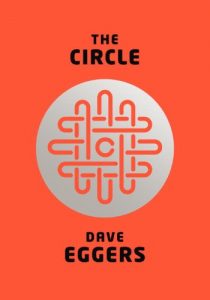The Corrections
Jonathan Franzen
Review by Dan Geddes
See also review of Franzen’s Freedom
The Corrections admirably portrays the values of both contemporary American yuppies and their square parents.
While the three main characters are well-spoken East Coast professionals, their parents’ Midwestern, mid-century worldview is also charitably represented. But between these lies the conflict; and it allows Franzen to highlight fissures in American society. At its core, this is a family novel, but the generational and regional East Coast/Midwest differences within the Lambert family also sketch American society at the end of the twentieth century. It is an odd irony that a firestorm of controversy surrounded the book’s publication because of (now New York based) Franzen’s declining to appear on that organ of Middle America, “The Oprah Winfrey Show.”
Franzen begins with a portrait of an aging couple, Alfred and Enid Lambert, in a malaise of retirement. Alfred, the former chief engineer for the Midland Pacific railroad, has Parkinson’s disease. Enid wants her three adult children (two in Philadelphia, one in New York) to come back to the fictitious town of St. Jude for just one more Christmas. The eldest son, Gary, is a bank vicepresident, whose wife uses passive-aggressive techniques of destroying his sanity (such as pitting their three boys against him) to prevent him from making them spend Christmas with his parents in St. Jude. Chip, the middle child, is a failed screenwriter in New York, who was fired from his university teaching position because he had an affair with a student. And the youngest child, Denise, is a top chef in Philadelphia, but is having an affair with her boss’s wife.
The Corrections is a guilty pleasure. It has no plot, but holds our interest because of Franzen’s sharp observations. Franzen’s power of description—even of the familiar detritus of new consumer products—is charming. Franzen’s perceptiveness of his characters exudes a humanity that makes us forgive the wicked fun he has with characters. Poor old Alfred, while humanely described, is subjected by Franzen to many a humiliating scene, including demented show-downs with his own talking feces, a plunge into the Atlantic, and cutting his gums on his daughter’s baguettes.
Chip is similarly a plaything for his creator. Chip commits the fatal error of being seduced by one of his students at the university, for which he then loses his job, apartment, savings, and self-respect. Chip is Franzen’s representative in the novel, and Franzen’s indictment of Chip’s literary intellectual consciousness provide some of the novel’s funniest moments. Chip’s worldview is a parody of the post-modernist, politically-correct academic thinking of the Nineties. He is a professor of Literary Artifacts (an echo of the department of Hitler Studies we see in DeLillo’s White Noise). Instead of discussing literature, Chip screens a TV ad campaign for his class, and then facilitates discussion about the suspicious motives of the W— Corporation (clearly Microsoft) that launched it. Chip’s screenplay is ultra lit-crit-y, and is ridiculously inappropriate as a Hollywood screenplay. In perhaps the ultimate poetic revenge for a professor of literary artifacts, Chip’s life freefalls until he is reduced to working for an internet scam, selling shares of Lithuania.com from Vilnius. Chip’s hilarious transformation from Foucauldian critic to dot-com entrepreneur reveals the hypocrisy that had always been present in his consumption-oriented lifestyle.
Franzen is consciously influenced by novelists such as Thomas Pynchon, Don DeLillo, and David Foster Wallace. Franzen even uses the memorable family name of Driblett, echoing a minor character’s name from Pynchon’s The Crying of Lot 49. Wallace is a good friend of Franzen, and their styles bear close resemblance. Both employ cloyingly accurate names for everything, often using even the chemical names for things. Both appear conversant in brain chemistry, as well as the use and abuse of anti-depressant medication. But the chemical descriptions are juxtaposed with each author’s clear command of the hip and the contemporary. You could call this novel Correcting David Foster Wallace, as Franzen was self-consciously struggling with Wallace’s accomplishment of Infinite Jest (a novel which dwarves even the outsize length of The Corrections). Cloying accuracy is the bread and butter of these stylists. Wallace, in stories like “The Depressed Person” uses his insight into people largely to be cruelly funny. And while the main charm of The Corrections is the (often cruel) humor, what is impressive is Franzen’s ability to see both within his characters and on the surface. He blends the insights of the author with the perceptions of the character. His moments inside the heads of Chip, Gary, Alfred and Enid, and Denise are convincing, funny, and lend the work its credibility.
Franzen critiques 1990s America through the Lambert family. The two generations of the family contrast Midwestern with East Coast values. Alfred and Enid value “socially useful” work (like Alfred’s job as railroad engineer) with the jobs of their children—stock broker, cultural studies professor, chef—careers possible only in an affluent society. Enid had fantasized that Denise would marry a clean-cut young man engaged in socially useful work, such as medicine. Instead, she marries a much older Jewish chef, and then divorces him after only a few years. They similarly hoped that Chip would follow Alfred in technical work, rather than become a literature professor.
The Lambert children all settled on the East Coast and live their lives as “corrections” to those of their square, Midwestern parents. Chip prides himself that he doesn’t have his father’s old-fashioned, reactionary views on race relations or politics. Gary’s internal dialogue consists largely of citing evidence to himself that he has avoided the clinical depression that supposedly plagued his father’s life. Even as a bank VP he works normal hours, and so doesn’t lose himself in his work as Alfred did. Denise’s correction of Enid involves less conventional morals, and a East Coast sense of elegance. During lunch at Chip’s Manhattan apartment (with Chip absent), Enid attempts to impress Denise with the menu and decorations of a St. Jude wedding she had just attended; Denise refuses to voice her approval of the wedding’s style, showing her transcedence of her mother’s taste.
The Lambert kids, however, have clearly not transcended their parents as they would like. Gary’s whole life is intended as a act of one-up-manship over his parents’ life. His affluence surpasses what he had growing up (though this affluence is attributable also to his wife Caroline’s hefty inheritance). But his correction of his family’s lifestyle, his higher affluence, is negated in the eyes of the rest of the family because of his bullying. The eldest child, he seems anxious to take on the mantle of head of the family as Alfred degenerates into incapacity. He works on creating on All Time Top 200 Lambert family photograph album. He tries to pressure Enid into giving up the house and moving into assisted living in Philadelphia. Gary is perhaps at his most characteristic when the Axon Corporation offers $5,000 to Alfred for one of his forgotten patents. Gary assumes his parents are being taken advantage of, and that he, the financially savvy son, knows how to deal with rapacious corporations like Axon. Gary fails to extract a higher payment for his father’s patent, but invests lots of his own money in Axon—only to lose it in a market correction. Thus, Alfred’s lifetime ultra-safe investments seem wiser than those of his portfolio manager son. Gary, despite his constant monitoring of his depression, seems a repressed workaholic like his father. Gary is the villain of the three children; he is bossy to his mother, and his internal monologues reveal his inhumane condescension to less privileged individuals, whether fat, loutish Midwesterners, or young women in his office compared to whom he feels far too superior to have affairs.
Denise appears the most mature and humane of the Lambert children. She conducts herself with a self-honesty and forthrightness that eludes her brothers. Her story is one of self-exploration of her sexuality, of trying not to hurt others, largely by applying herself feverishly to her work as a chef. But Franzen explores her character development—from a hardworking student, to a hardworking summer intern in the signals department of Alfred’s railroad, to college, and her first cooking jobs, and her failed first marriage to an older man. Her trim figure and good looks attract attention, and yet she lives something of a hermit’s life in a spare apartment in Philadelphia. She, like Alfred, has learned to hide in her work.
Then Denise is offered her dream job. Brian, a freshly minted millionaire after writing a music software program and selling it to the monopolistic W— corporation, hires Denise for a ludicrous salary to be chef at his cool new restaurant. They tour Europe together in search of culinary ideas, and nearly commit adultery. Denise ultimately resists him because of her fear that were she to succeed Robin as his wife, her own personality would be subsumed, and she would become an appendage to Brian. But this refusal is not the end of Denise’s development and self-exploration. Franzen’s insight into his female characters is impressive.
The Corrections is a great accomplishment, mainly because of Franzen’s ability to show signs of compassion in what is often a sarcastic, irony-drenched work. I’ve already re-read The Corrections, and though my favorite passages were equally strong and hilarious upon re-reading, the work is not one that is better during a second reading, as we make all our discoveries during the first reading. Franzen invested nearly all of his efforts into his characters (at the expense of story), but I suspect that Franzen’s characters will persist in my consciousness longer than the characters of more compelling stories.
Amsterdam
1 April 2002
See also review of Franzen’s Freedom









Be First to Comment